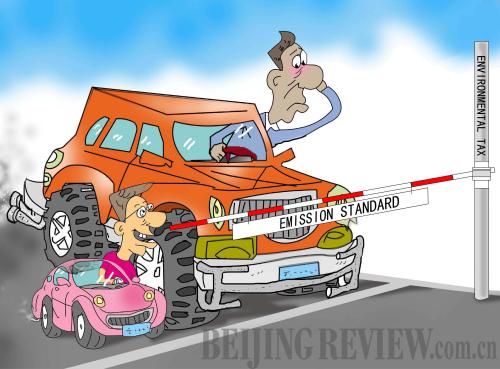|
 |
|
LI SHIGONG |
On February 9, Zhang Lijun, Vice Minister of Environmental Protection, said that his ministry, along with the Ministry of Finance and the General Administration of Taxation, were working on the feasibility of an environmental tax.
At the end of January, Zhang Yanyou, Deputy Director of the Beijing Municipal Development and Reform Commission, told a session of the local legislature that the Central Government had already commenced research on levying environmental tax on automobiles. He said owners would have to pay tax in line with the emissions of their cars—the more a car emits, the more the car owner has to pay. Zhang said it was likely the tax would be applied in Beijing first.
Compared to traditional "order-obey" management, supporters say that a specific environmental tax will encourage technology innovation and prevent high-polluting activities. For instance, the tax might force polluting industries to develop alternative, non-polluting systems. This would in turn reduce enterprises' tax payment and protect the environment at large. In addition, it will provide a new tax source for the government, and so provide funding for it to sponsor pollution control programs, which entails possible benefits in reduction spin-offs.
As for the planned auto emission tax, it is expected to increase the cost of car uses. Consumers might then have to use subways or buses or adjust their behavior to offset rising costs. In the meantime, makers of high-emission cars would voluntarily develop fuel-efficient technology to enable their cars to be sold. Or they would be driven from the market by regulation or falling sales.
But some critics say if the introduction of environmental tax is part of a tax reform, the government must produce a detailed plan, and overhaul existing environment-related taxes first. But it would be neither easy nor realistic to complete this massive work in a short period of time. An environmental tax out of the blue would become just another means for government to increase state revenue.
Right timing
Xu Guangmu (National Business Daily): With the introduction of environmental tax, the social costs arising from environmental pollution and ecological damage are transferred into production costs, which would then lead to environmental resource redistribution through the market mechanism. The implementation of the tax is meant to reduce pollution. It would force businesses to re-evaluate resource distribution efficiency.
Cars, as the major contributor to environmental pollution, must be held responsible for the pollution they cause. They bring convenience to our work and life, but they also give rise to enormous environmental degradation. Auto emissions have already become the biggest source of air pollutants. Worse still, with ever-increasing car sales, the environment is faced with bigger challenges. In light of such conditions, levying an environmental tax on cars becomes an important measure to control auto emissions.
Official figures show by the end of last year, the total number of cars on the roads had exceeded 186 million in China, and it is expected to rise substantially this year. This piece of news provides two useful bits of information. On the one hand, the prevalence of cars is sure to stimulate domestic demand, and drive economic growth to a large extent. On the other hand, the environment will be confronted with bigger problems. If no effective measures are taken, the string of negative influences brought about by auto emissions will make us suffer. Therefore, it is the right time to levy environmental tax on automobiles.
Tian Fang (China Business Herald): Statistics show more than 13.5 million cars were sold in China in 2009, making the country the biggest car market in the world. Automobiles have become a daily necessity for an increasing number of Chinese people, meaning it will take a long time before pressures on the environment lessen. At present, environmental pollution is increasing rapidly. Therefore, it is wise and necessary for the government to impose environmental tax on those who pollute the air—the more they emit, the more tax they must pay. In taking legal actions to protect and improve the environment, a tax is the most effective measure of creating a resource-conservation, environment-friendly society.
Members of the Organization for Economic Cooperation and Development have created nearly 400 environmental taxes. As a member, China lags far behind its peers, as it does not have a specific environmental tax, let alone imposing it. In the early years, it was not a problem because there were no international constraints. But things are different now. Environmental problems have become a global issue with growing calls for environmental protection. The international community has adopted a large number of environment-related treaties enjoying the full force of law. Anyone who breaks the treaties will be punished. As a responsible country, China has a compelling obligation to protect the environment according to internationally accepted practices. If we fail to do so, the consequences will be disastrous.
|
